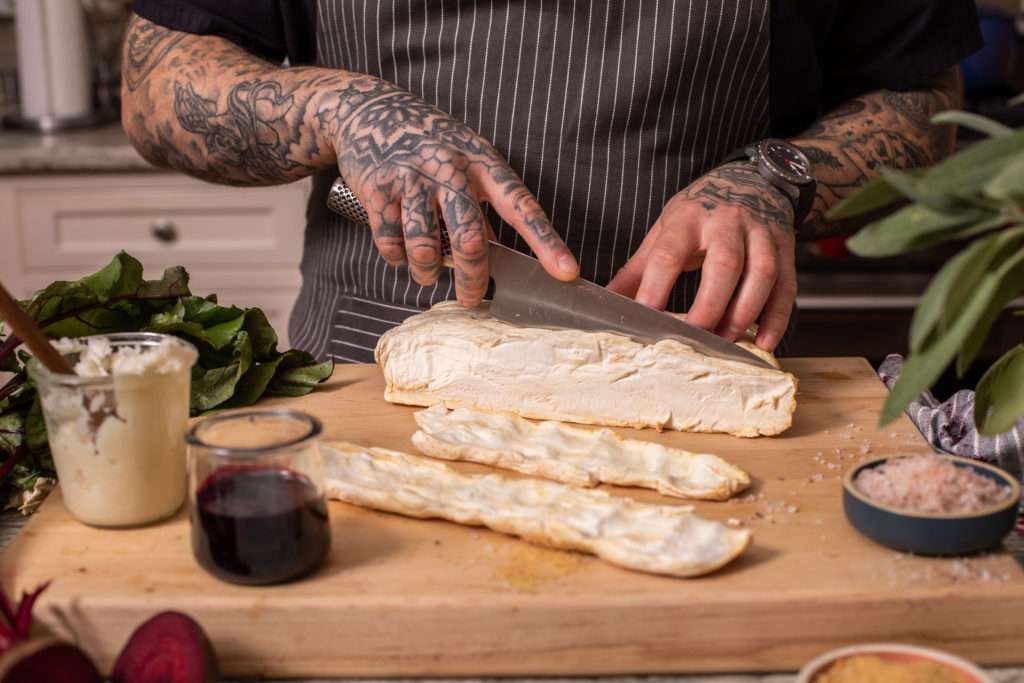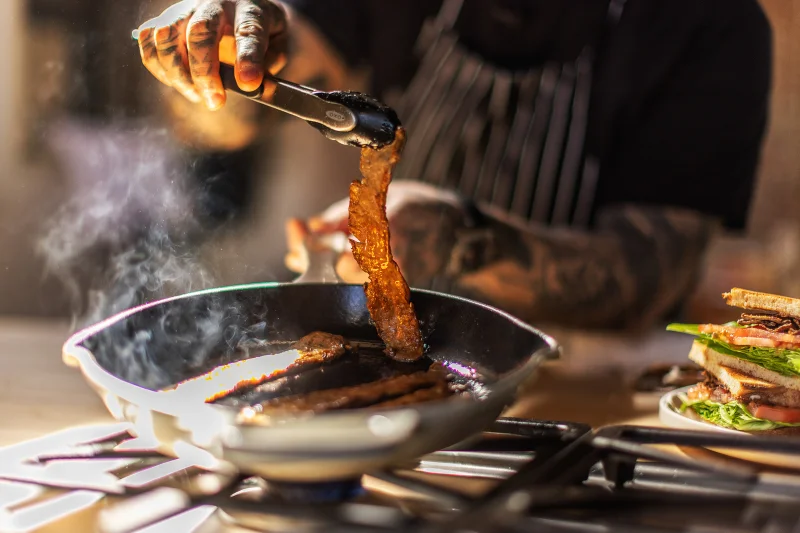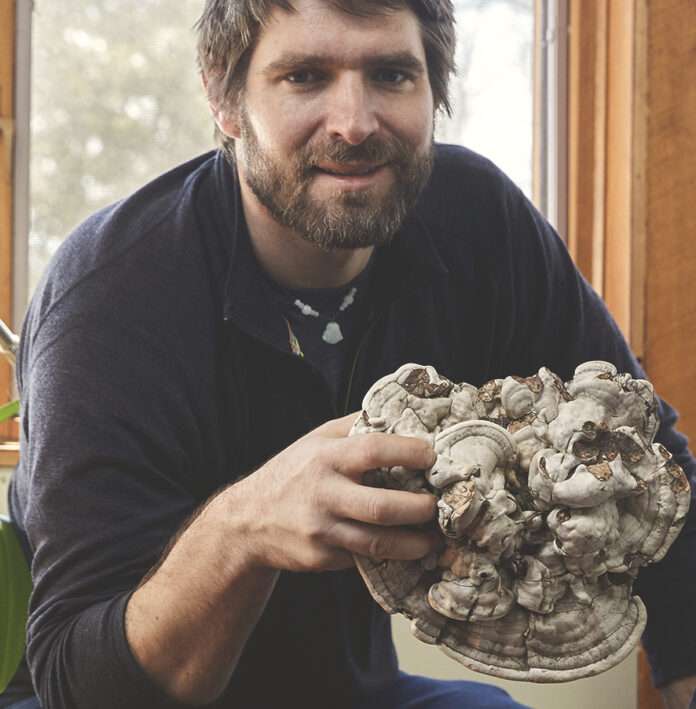Eben Bayer’s journey began as a quest to solve a problem for a college project. Today, as co-founder of mycelium-focused Ecovative and MyForest Foods, he stands at the forefront of a revolution in the food industry.
Eben Bayer’s journey to disrupting the food system began with a college assignment. A student at Rensselaer Polytechnic Institute in 2007, Bayer embarked on a mission to find meaningful solutions to complex problems. This mission would lead him to the discovery of mycelium, a material that’s now central to his groundbreaking food-tech venture, Ecovative and its food-focused brand, MyForest Foods.
Bayer’s mycelium discovery laid the foundation for creating Ecovative — the mycelium-based biomaterials company he co-founded in 2007 and parent company to MyForest Foods, which uses mycelium to replicate bacon and other popular meat products.
Sustainable food solutions
Earlier this month, MyForest Foods announced it closed a $15 million Series A-2 funding round, ed by MyForest Foods’ parent company, Ecovative Design.
The fresh funding brings its total investment to more than $55 million, which includes help from Robert Downey Jr.’s FootPrint Coalition, to support its next chapter of growth and further bring its hero product, MyBacon, to more consumers.

“The plant-based category is at a unique inflection point, where only the most promising and delicious innovations will thrive. I believe MyForest Foods has met this call with its unique MyBacon offering,” Gary Hirshberg, Co-Founder of Stonyfield Farm and MyForest Foods Board Member, said in a statement.
“The company is scaling its operations to meet consumers’ growing demand. With this additional investment, it will expand its market presence, attract new retailers, and educate customers about the power of mycelium,” he said.
“It’s always been important for me to find a solution to a problem, and it’s no question the food industry has its faults. There is ample room for growth,” Bayer told Ethos via email.
At the heart of Bayer’s approach is the pursuit of sustainable solutions. His perspective is guided by the belief that the best innovations will leverage nature’s existing resources rather than engineering entirely new constructs. “Feeding our future sustainably — without sacrificing flavor — is our number one goal,” he says.
“Our patented AirMycelium technology has unearthed a revolutionary way to create natural foods that rival traditional meats while also reducing the land, water, and carbon footprint required by industrial animal agriculture practices,” Bayer says.
Mycelium’s properties mimic traditional meat in texture and taste, paving the way for what Bayer says puts MyForest, and other companies leveraging mycelium, at the forefront of a food industry disruption. Unlike many existing plant-based options, mycelium can be used to create whole-cut products. Bayer explains, “Mushroom mycelium attributes are much closer to ‘meat’ than plants. Beef Steak Polypore, Chicken of the Woods, and Lobster Mushroom are named as such because they already have similar meat-like properties.”
The magic of mycelium
Bayer says one of the biggest hurdles the plant-based market faces today is perfectly blending taste and mindful ingredients.
“Most of the commercially available products today haven’t hit the mark in satisfying consumers without mile-long ingredient lists,” he says. “Despite over 80 percent of traditional meat sold today being under the ‘whole-cut’ umbrella (think chicken breasts, fish filets, sliced pork bacon, etc.), most of the alt-meat products fall under the ‘ground meat’ category. This leaves the plant-based, whole-cut category wide open.”
Biotechnology solutions like mycelium guide and leverage the creative forces of nature.
-Eben Bayer
Bayer’s not alone in leveraging mycelium as a meat substitute. Companies like Colorado’s Meati, the U.K.-based Quorn, and others use mycelium and mycoproteins because their properties mimic meat so well.
Mycelium also requires significantly less energy than conventional meat or even the recently USDA-approved cultivated meat alternatives.
“While I appreciate the innovation being done to reinvigorate the alt-meat category, I see mycelium as offering the best path forward for flavor, marketability, scale, and environmental impact,” Bayer says.
“Cellular meat requires astronomical energy inputs and is met with mixed responses, given it’s far from its natural origin. I believe we’ve managed to remediate these concerns with options such as mycelium, and we should continue focusing our efforts on more sustainable solutions.”
To Bayer, the magic of mycelium offers a path to reimagining our food systems without compromising on taste or environmental impact and without the ethical concerns both conventional and cultivated meat present.

“Rather than engineer and construct new food products, biotechnology solutions like mycelium guide and leverage the creative forces of nature to produce new categories of food and other products,” Bayer says.
But despite the many advantages of mycelium, scaling production to meet commercial demand remains a challenge. But the recent opening of Swersey Silos, MyForest’s large-scale aerial mycelium farm, is a testament to that commitment. The facility has the capacity to grow three million pounds of mycelium in a year — a testament to the vast possibilities of this material.
The Cooperative for Ecovative’s Forager brand also relies on the farm; it makes plastic-free textiles and foams from mycelium and brings a group of brands together to work toward one common goal.
Ecovative has also worked with a number of universities, the U.S. Environmental Protection Agency (EPA), and the Defense Advanced Research Projects Agency (DARPA) to explore the possibilities of mycelium.
“Instead of having each brand look for different specifications, this helps us get a product to market faster for many clients instead of one product at a time for each client,” Bayer says. “This is exponentially better for the planet as it speeds up our go-to-market strategy of genuinely sustainable materials.”
Agriculture 2.0
The integration of mycelium into the food system is not just about creating new products, but it also carries the potential to change how we think about agriculture, Bayer says. That’s especially evident in the launch of the vertical mycelium farm.
“Our vertical mycelium farm, Swersey Silos, is the world’s largest AirMycelium farm and the first of its kind at this scale,” Bayer says. “With this infrastructure innovation, we can save on energy and use a fraction of the land compared to traditional farming.”

Alongside the launch of MyBacon, the MyForest Food team is also working on a mycelium-based jerky product and exploring other whole-cut meats. But while mycelium holds great promise for transforming the food industry, Bayer’s vision goes beyond just products; it’s about the journey of discovering solutions and finding ways to make a real impact on the world.
“We’re living through an interesting and exciting time for the food industry,” he says. “Consumers are waking up to their choices’ impact on Spaceship Earth, and industry disruptors are working hard to meet this demand.”
Bayer says the team feels confident in mycelium’s ability to grow and harvest quicker than the time it takes to raise animals or grow pea plants for other protein sources.”We remain hyper-focused on our belief that we can meet the demand while nurturing the planet and not harming animals.”
“Thanks to mycelium,” Bayer says, “we can have our (mushroom) meat and eat it too.”
Related on Ethos:


